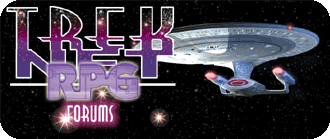Quote:
Originally Posted by JALU3
So everyone is empowered to strive to fullfill their own ambitions? Whether that ambition is to hunt, and skin one of every non-sentient creature on the planet, or be to pass on the knowledge of how VHS system works and how to repair it, and all those other quirky little things that one could strive to do.
The first one probably gets you put in therapy. The second one gets you hanging out in antique shops.
Quote:
So what if your ambition and what makes you feel fulfilled is against the grain? Say your a a Terraist or Earth Firsty? What then?
You write pamphlets and run for office.
Quote:
And/or . . . What of the Amish . . . say they survive WWIII . . . are they allowed to live in their form of 15th century "utopia" with
their self-inforced limitation?
As long as they fix social problems like the massive suicide rate among females, what would the problem be? There's probably tons of luddite colonies around.
Quote:
What of other groups . . . are they allowed to venture out into the stars and create their own ideal "utopian" societies?
Yes. Of course they are; how many human colonies have we seen that are based on some form of "ideal living"?
Quote:
Those within those socieities, are they allowed to freely leave them?
The Masterpiece Society?
Quote:
Those who wish to join these inclosed socieities, are they allowed to freely join them, without that societies consent?
They'd have to take that up with the society. Presumably, it would be up to the colony's leaders, but I doubt that excluding someone from, say, Beta Amishland V would be infringing upon their rights.
Quote:
Originally Posted by JALU3
I guess that is why some people disliked DS9, and the ideas that are wrapped around my chosen quote in my signature.
Before DS9, it was commonly accepted that the Federation was a utopia, that it was the spring which the good within the galaxy comes from or at least it best symbolised a utopian and peaceful future for humanity and those who chose to associate themselves with us as a unified society. DS9 changed that equation, starting with the Marqui and the view of the Federation from those who weren't within the happy core bubble, as it were. It showed a possibility of a future utopia which looks pretty, peaceful, and flawless from far away . . . but having some of the same problems but in a different setting that we experience today.
"It's easy to be a saint in Paradise."
It is, and that's what the core worlds of the Federation are. DS9 didn't say the Federation wasn't Utopia; it pointed out how difficult it can be to keep it Utopia. Unlike the inferred reality of magical cohension in TNG, DS9 displayed a society built upon the individual choices of the people involved. Choices made by people seeking fulfilment, whether it's Sisko's dad or Bashir's parents.
Quote:
However, given the reality shown in DS9, it is shown that not everything is perfect within the Federation. There are groups which desent from the majority. Most are "mostly harmless", some go so far as being seperatist, and others are down right violent and hostile.
There were always dissenting groups, and I don't think that the previous examples from Trek implied that there weren't.
Quote:
As for humanity. Although it has evolved socially, I think it still tugged by forces which could lead to being more brutish, or more centric, or less open, or so open it losses itself. No society truly escapes it, for it needs to be renewed generation after generation . . . for it isn't static, and the society is always evolving and changing. Therefore it is always under a threat of going down the possibility of self destruction or societal implosion or explosion.
"Let me tell you something about Hew-mons, Nog. They're a wonderful, friendly people — as long as their bellies are full and their holosuites are working. But take away their creature comforts ... deprive them of food, sleep, sonic showers ... put their lives in jeopardy over an extended period of time ... and those same friendly, intelligent, wonderful people will become as nasty and violent as the most bloodthirsty Klingon. You don't believe me? Look at those faces, look at their eyes..."
It's not about magically angelic humans, it's about people seeking to improve themselves. Trek has faith that they can improve, and that it's a worthy pursuit.
Moreover, I think that the 'dark ages of the Federation' idea is lame simply because it's a lame rehash of stuff that's been done over and over in SF, from reestablishing an empire in Foundation to 'the dark ages of the Federation with its serial numbers filed off' in Andromeda. I guess you could run it, and it's possible that it could be done well, but I'm not sure it'd be the best way of utilizing the ideas in Trek.
